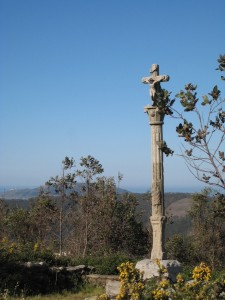 First things first – I survived the monologue! After twelve years off the theatre’s stages, I got through it intact.
First things first – I survived the monologue! After twelve years off the theatre’s stages, I got through it intact.
In fact that smiling face on the left is me after the event, still in “costume,” signing books and enjoying myself.
Who’d have thought it?
Thank you to my dear friend Nina for taking the photo and proving to me that I really did have fun.
The response has been overwhelming, and has made me very grateful that I pushed myself to do it. I’ve honoured my original intention, as well as the promise I made to my sin-donors – to write a monologue for performance. The question now is whether it has another life. I’ve had lots of encouraging – even determined – calls and emails suggesting it should have a life of its own.
I’ll see how the dust settles. I can now see a way to write it, and am tempted by the possibility of expanding it to about 75 minutes. But I’m really not sure about performing it. That was a strange experience. I remember standing in the wings about to go onstage, and then I remember tucking happily into my sleeping bag and feeling such pleasure that it was done – and I recall nothing in between! A bit like the days when I walk and am able to see myself from outside myself.
Anyway, I think a script could be given over to one of my many wonderful actress friends, but some people have suggested it needs me in it. That makes a kind of sense, coming from those who were part of that invited audience and who knew the “Ailsa” they were watching was the Ailsa who had walked and written it, but I think that other audiences would simply watch the story unfold and, hopefully, enjoy it as a full-blooded performance by a wonderful actor – if it can be made theatrical, as I hope.
SO…that’s the news.
And what of what I learned?
For me, the most intriguing conversations I’ve had as a result of the performance have been about the issue of lust. For the monologue, I chose to focus on particular sins and characters that could fit together to tell one coherent strand of the book, because I knew it was impossible to cover everything. That’s why there is a book!
Part of the strand I dramatised was my battle with desire for the amigo character, because his story spoke to so many of the sins I carried.
Several people have commented that they found my expressed desire confronting, both onstage and in the book – particularly on my husband’s behalf. That they would not want their partner or wife putting those admissions into the public sphere. That my husband is brave for being able to hear it. That it is too much.
That intrigues me. It ignores the fact that I state very clearly that I didn’t act on the temptation. It also ignores the fact that my husband was potentially just as likely to have such desires in my absence – after all, marriage does not stop us from feeling our natural human urges. Or did I miss something? And it ignores the fact that I attempted full and frank disclosure, since confession was at the root of the story. That one of my core beliefs is in the power of confession and its potential to free us, to offer us space to be authentic and to live large.
Was I to let myself off the hook? Surely that would have defeated the point? Surely it would have been a lie not to confess? And that would have been the sin!
What perplexes me most, though, is that the mere possibility of sexual betrayal is more compelling than the actuality of my lived incidences of pride and anger – my real “sins”. Pride in particular (my great “sin”) is a nasty, mean-spirited thing. It shuts others out, refusing to allow them to offer assistance or knowledge. As I learned at the very beginning of the project, it is a sin that sets itself up as the strong/smart/more experienced/more capable one. It is the sin that says “No, thanks, I know way better than you and I’m just fine without you.” It’s hurtful, and doesn’t allow others to share their wisdom or strength. It is arrogant and cold.
I could go on, but I suspect you get the drift of my ponderings.
What is this fascination with sexual desire? With lust? It seems such an ordinary thing to me. A normal thing. If we didn’t feel it in some small way – whether simply admiring another’s physical beauty, or recognising a powerful urge – would we still be fully alive? See, I don’t think that the thinking or experiencing of desire is – of itself – a bad thing. It’s a mark that we are awake, isn’t it? Like anger, it’s not the response or emotion, it’s what we do with the response. Well, I reckon…
Anyway, I’m mulling over it, but thought I’d float the idea and see if others find it curious. What say you?
Meanwhile, to elevate this post above my ruminations, I was sent a magnificent Neruda poem by Andrew, who is, I believe, a subscriber to the blog (as you know I can’t tell who subscribes and who pops in), and who has sent me many wonderful offerings for which I am most grateful. This one arrived yesterday and I’m mad for it. It’s Pablo Neruda. No need to say more…
From so much loving and journeying, books emerge.
And if they don’t contain kisses or landscapes,
if they don’t contain a man with his hands full,
if they don’t contain a woman in every drop,
hunger, desire, anger, roads,
they are no use as a shield or as a bell:
they have no eyes, and won’t be able to open them,
they have the dead sound of precepts.
Thanks Andrew. It is beautiful.
 Thanks also to Arts Centre Melbourne for creating the scenario in which I ultimately had to write the monologue. I’d never have done it without you and your supporters, and I’m glad I did.
Thanks also to Arts Centre Melbourne for creating the scenario in which I ultimately had to write the monologue. I’d never have done it without you and your supporters, and I’m glad I did.
Gracias to the astonishing Rachel Burke for miraculous light, and to Peter – my true north – for patience and advice in the fearful moments. And to these old friends, who were pulled out for the occasion, to give me courage and authenticity. The mighty Merrells…
Finally, a little housekeeping…
Some book events coming up. Please check the tab above – EVENTS AND MEDIA – to see if there is something that appeals. As you know, this pilgrim loves company.
Thanks for reading…for journeying…













